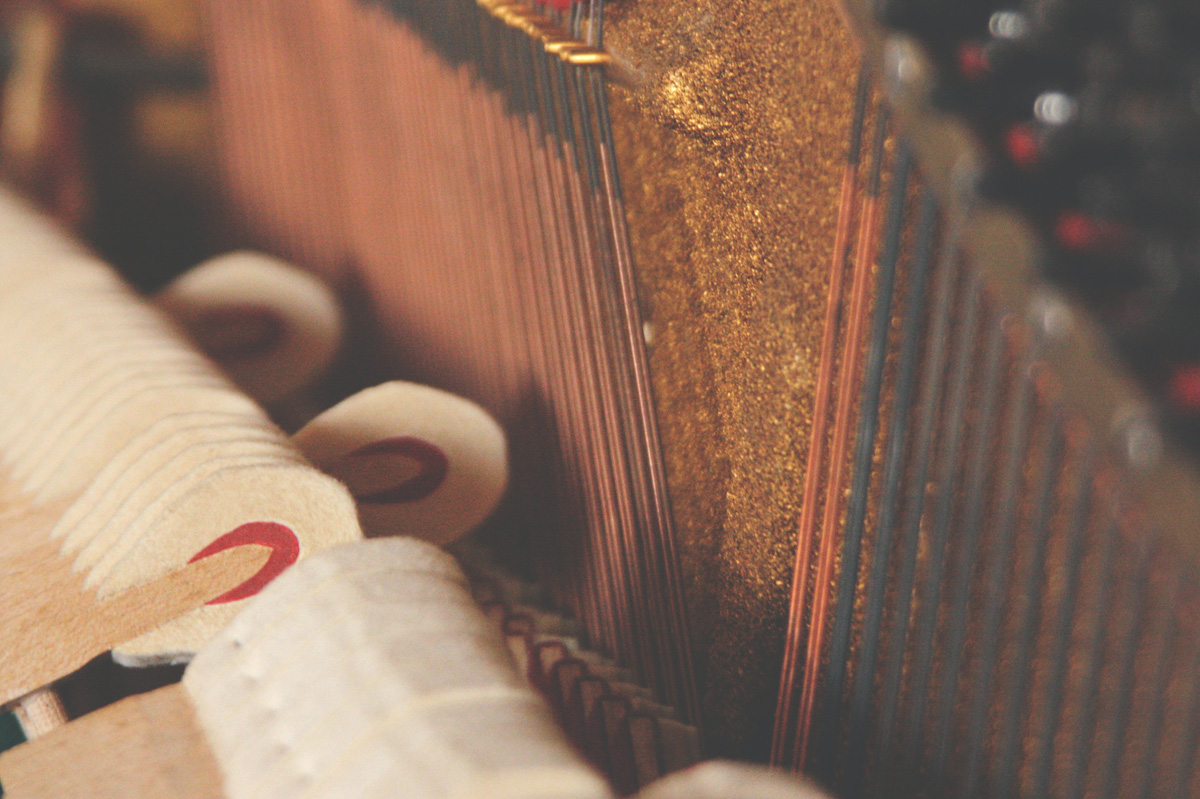Professional Piano Tuning By Ear
Owner Rob Gardener has been Tuning Pianos for over 20 years. He Tunes 'By Ear', meaning he does not use an electronic tuning device. He has studied extensively and understands the relationship of the notes in the 12-tone musical scale, which, when combined, produce the Beautiful Harmony we call Music.
An expert that tunes by ear can often do a better job than one who uses an electronic tuning aid. This is because different sizes and types of pianos have slightly different 'string scales', meaning the relationship of length and mass of the strings to each other. When tuning by ear, he is able to hear this relationship and thereby tune your piano correctly to bring out the true tone and beauty of your instrument.

Question & Answers
Tuning your Piano to A-440
Click on the Questions below to see the answers.
A: All piano manufacturers and dealers recommend that pianos, whether they be spinets, consoles, tall uprights or Grands should be ideally tuned 2 times per year to stabilize string tension and maintain pitch at A-440.
A: New pianos particularly need to be tuned 2 times per year or more. as the strings and frame are still 'settling' and therefore will go out of tune very quickly.
Between the manufacturer and sale of any new piano, it is tuned approximately 10 times or more to stabilize the string tension. Each time the piano is moved, it will also need tuning, and most pianos nowadays are made overseas.
It is a big mistake to neglect a new piano by not tuning if for the first year or two that you own it. This is the time that it is most likely to go severely out of tune. Even if you, the owner, think it sounds good, you should ask yourself, 'Do I really have a trained musical ear? Am I qualified to evaluate the tone of my piano?'
I have seen brand new pianos go 1/2 step or more flat within 1 1/2 years after purchase by not being tuned. The cost of raising pitch (back to standard pitch of A-440) can be $200 to $300. In short, you are not saving money by not tuning a new piano. It actually may cost you more, and additionally is bad for the instrument.
A: All modern pianos and western musical instruments, from about 1930 to the present day were designed and manufactured with the note 'A' (above middle C) to vibrate at the rate of 440 vibrations per second. This is known as A-440, or standard pitch.
The rest of the piano is tuned to very precise mathematical relationships of vibration to this note...A-440. When a piano is perfectly tuned, these mathematical relationships synchronize to form the beauty and harmonies that we call 'music'.
A: Over the years, the string tension of a piano that is not tuned will gradually go flat, lowering as much as 1 or 2 notes or more (1/2 step to 1 1/2 steps flat). It will take 2 or 3 consecutive tuning (2 or 3 weeks apart) to raise the pitch back to A-440, which is what your piano was designed for.
A: The piano tuner who tunes your piano every 3 or 4 years is probably tuning it at a lower string tension, not at A-440. This is the only way to make your piano sound 'ok' with just a single tuning.
A piano tuned at a lower tension will not sound as good as it would if it were raised 'up to pitch' (A-440). At a lower tension, the bass strings will often sound 'rattlely' and raspy and lack volume. The high notes will not sound as clear and bright as they would if they were also tuned 'up to pitch'. In general, a piano tuned at a lower pitch will lack the fullness of tone, volume and clarity that it was designed for.
A: If you practice singing with your piano, whether you are an amateur or professional, sing in church or a choir, or just like to sing for your own enjoyment, it is very important that your piano be tuned to A-440, standard pitch.
When you sing while playing your piano, you are training your voice by matching the note you are singing to the note on the piano.
If your piano is out-of-tune or tuned to a lower pitch, you will be practicing incorrectly and will never develop a good musical ear.
Female vocalists particularly need their pianos tuned to A-440, as they need to train their voice to sing high notes, right on pitch. For example, if you practice singing with a piano that is at a lower pitch, and then sing in your church choir, you may have big trouble singing those high notes.
If your choir members are giving you 'dirty looks', maybe it's time to tune your piano...to A-440!!
Contact Rob Today to Schedule an Appointment
-
Landline: 856-795-4128
Cell: 856-701-4064 Basic Inquiries -
Email: rob@crystalclearpianos.com
For Questions or Photos
Appointments are booked ONLY by Phone!!
No Text appointments accepted without prior verbal discussion.
NOTE: I cannot answer long Technical Questions by Text,
so Please call me and Let's Talk the Old-Fashioned way!!!!